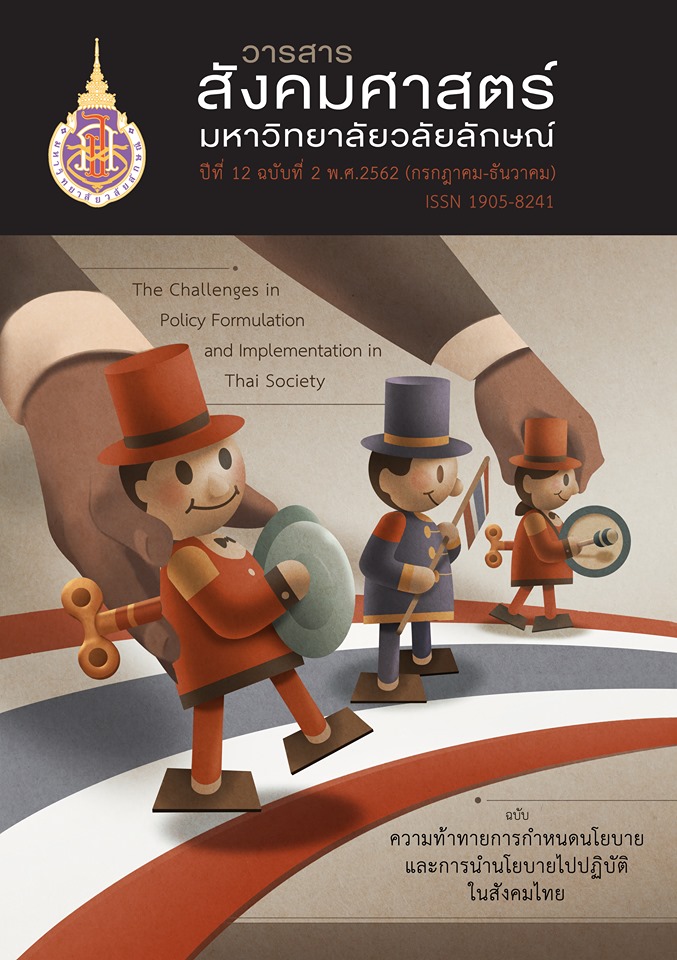Factors Affecting Malay Muslim Youth Life Skills Development in Islamic Private School
Main Article Content
Abstract
This qualitative research aimed to study factors affecting life skills development for Malay Muslim in small-sized Islamic private school in Pattani Province. The subjects of this study included 16 school administrators, teachers, students’ parents, religious teachers, community leaders, current students, and alumni, side by side with three experts. The data were collected through in-depth interviews, focus group discussions, and observations. The collected data were, then, categorized and connected for conclusions and interpretation. The reliability of the conclusions and interpretations were examined by experts of Malay Muslim’s life skills development.
The result of the study was that there were two factors affecting life skills development for Malay Muslim in small-sized Islamic private schools-inner factors, and outer factors. There were six inner factors including the school’s strict rules and regulations, good care for students, relative-liked organizational culture, teacher’s model, peer relationship and learning, and schoolmate relationship and learning. There were four outer factors including outside-school friend relationship and learning, cooperation between the school and the students’parents, cooperation between the school and the community, and networks with outer organizations.
The conclusions brought about the following suggestions. Firstly, since teachers were a major model for students, Islamic private schools in the area should praise and give compliments to teachers and school officers who were good models for the students; also, the students should be inspired to adapt these teachers and school officers’ characteristics into their lifestyles in order to develop their life skills. Secondly, good care for students was also an essential factor developing the students’ life skills. Therefore, schools should create or provide a mechanism, or an evaluation system concerning Malay Muslim students in their schools’ life skills development concretely with the cooperation from every agent related to the students.
Article Details
Copyright: CC BY-NC-ND 4.0
References
Amatayakul, A. (2009). Muslim youth amid the globalisation. Academic Report. Songkhla, Thailand: Issara Institute.
Azan, T. & Kasetchai, L. (2010). Factors related to affect stress and stress management for students of Islamic schools in Hatyai district, Songkhla province. (Master of Arts in human and social development). Songkhla, Thailand: Prince of Songkla University.
Dolmanach, B., & Kasetchai, L. (2008). A study of Thai Muslim youth’s way of life to maintain peace in the three southern border provinces of Thailand. Bangkok, Thailand: National Research Council of Thailand and Prince of Songkla University.
Ibrahim, N. (2003). Philosophy of Islamic education. Pattani, Thailand: College of Islamic Studies, Prince of Songkla University.
Islamic View. (2010). Looking at education through Islamization. Islamic Studies and Muslim Communities Development for Peace Project Booklet.
Kasetchai, L., & Dolmanach, B. (1910). A study of Thai Muslim youth’s way of life to maintain peace in the three southern border provinces of Thailand. Songkhlanakarin Journal of Social Sciences and Humanities, 16(6), 973-988.
Maslan, M. (2008). Islam is the way of life. Songkhla, Thailand: Southern Health System Research Institution.
Nakonthap, A., Pi Ya Atchariya, L., Khaemmani, T., Wan Ari, A., Masathianwong, C., Phong, C., & Bualuang, A. (2007). The project report of research and development of local learning management in the three southern border provinces. Bangkok, Thailand: Thailand Research Fund (TRF).
Nurman, J. (2012). In calculation of ethical values and discipline into children and Muslim youth in three southern border provinces: Pattani, Yala and Narathiwat. Academics Journal. Office of the National Anti-Corruption Commission, 7(1), 30-41.
Office of the Educational Council. (2012). Educational management for sustainable development 2012 annual report. Bangkok, Thailand: Office of the Educational Council, Ministry of Education.
Phrae, S. (2008). Cultural skills. Bangkok, Thailand: Princess Maha Chakri Sinrindhorn Anthropology Centre.
Sadia, K. (2009). The application of Quraan and Hadith in the teaching of life skills in Muslim schools in South Africa. (Master of Arts in Islamic Studies). Pretoria, South Africa: University of South Africa.
Sarawut, B. (2007). The relationships of selected variables and school effectiveness of private Islamic schools in Bangkok metropolis. (Master of education in educational administration). Bangkok, Thailand: Srinakharinwirot University.
Suchat, S. (2011). Teenagers and religious communities in the new world. Sheikhul Islam Office Journal, 1(3), 37-40.
The Non-formal and Informal Center. (2010). The non-formal education curriculums in 2008. Bangkok, Thailand: Thai Public Education.
Thipwan, W., & Thon, S. (2012). Model of Islamic school appropriations for Thai society. Journal of Administrational Education, Burapha University, 6(2), 16-30.
World Health Organization. (1994). Life skill education for children and adolescents in school. London, United Kingdom: Department of Health.


